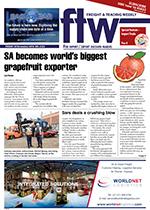New genetically modified organism (GMO) food labelling regulations adopted by Namibia could have significant trade implications for South African grain exporters, according to Grain SA. In fact, Namibia’s National Commission on Research, Science and Technology (NCRST) has said that the new regulations will affect all future grain exports to the country. Individually packaged raw grains, cotton, rice, sugarcane and potatoes must now be visibly labelled as “genetically modified” or “contains genetically modified ingredients”. Additionally, processed genetically modified food or feed must be labelled as such. According to AfricaBio Agri-biotech general manager Bongani Maseko, the cost implications of repackaging all goods designated for Namibia are extremely high. While the labelling-specific portion of the new regulations has noteworthy implications for exporters, one of the bigger challenges is the GMO product list published by the Namibian government last month. The NCRST has noted that when implemented, the new regulations will only allow for products on the approved list to enter the country. “We are currently trying to establish which products exported by South Africa to Namibia are not on the approved GMO list and therefore excluded from import,” said Maseko. He pointed out, however, that the list currently did not address the definition of GMO products. Additionally, Maseko noted that the new GMO labelling regulations determined a 0.9% threshold amount for the presence of a GMO in crops imported into Namibia, while South Africa’s threshold was sitting at 5%. If agricultural commodities fall above the 0.9% threshold they have to have the required labelling, whereas South Africa only requires labelling if crops are above the 5% threshold. “South Africa’s regulations will now not be in harmony with those of Namibia, with Namibia’s being more explicit than South Africa,” he said. “Also, the threshold that Namibia has set on GMOs is just impractical and will have a severe negative impact on local grain exporters. As South Africa is a GM-growing country, we do not distinguish between genetically modified or non-genetically modified crops.” The South African Agency for Science and Technology noted that in 2004 it was estimated that GM crops accounted for 24% of yellow maize, 10% of white maize, 50% of soybean and 85% of cotton in South Africa. South Africa currently ranks eighth out of GM crop producing countries. But, again, these aren’t the only challenges exporters will face under the new regulations. The NCRST announced that border control would now also be stopping, sampling and testing all grain consignments entering Namibia in order to test thresholds, verify permits and cross-check products in the consignment against the approved GMO list. Maseko said that these increased stops at borders would inevitably mean increased logistics costs as well as increased costs from the testing for either the exporter or distributor. “All grain imported will be tested at the border and further tests will be done at the new GMO testing, training and research laboratory launched in January this year,” he added. “The importer must pay the cost of testing on the Namibian side and the exporter must pay for the cost of testing on the South African side. This could mean that some companies could pay double for the same test if they are registered in both Namibia and South Africa.” Additionally, companies will be required to hold a permit to bring grains into Namibia, but only those registered in Namibia will be able to apply. “The regulations clearly stipulate that anyone wishing to trade in grains with Namibia must apply for a permit,” said Maseko. “The fact that only Namibianregistered companies may do so, shows that these regulations are explicitly territorial in nature.” He noted that South African-registered companies would have to have a Namibian-registered distributor who complied with the new regulations. Applicants who want to apply for the permit – provided on a yearly and not consignment basis – would need to pay an application fee of just under R1 000, accompanied by an emergency response plan as well as a risk assessment and risk management plan where applicable. Applicants have been given until 6 February 2019 to apply for the permit. While the GMO labelling regulations will have a severe negative impact on domestic grain exporters to Namibia, it is expected to have very little impact on the South African grain industry as we export fairly small quantities to Namibia.
INSERT with CAPTION
The cost implications of repackaging all goods designated for Namibia are extremely high. – Bongani Maseko

